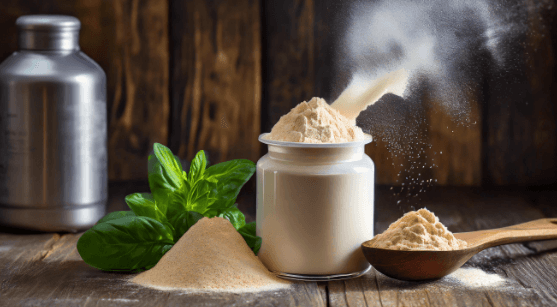Hey there, busy working parents! Let’s talk about the secret weapon in your never-ending battle against time: protein powder. Now, I know what you’re thinking – “What is Protein powder? Isn’t that for bodybuilders and gym buffs?” But hear me out, because this little gem is about to become your best friend.
Imagine this: It’s 7 AM, and you’re juggling breakfast, school lunches, and that big presentation. Who has time to cook eggs? Enter protein powder – just a quick scoop, a shake, and voilà! You’ve got a high-protein breakfast that’s ready faster than your kids can say, “I can’t find my shoes!”
But it’s not just about convenience. Protein powder is like that multitasking superhero that helps keep you full, focused, and fabulous all morning long. And for all you plant-loving parents, there’s a whole garden variety of plant-based protein powders, so you can keep it green and clean.
What is Protein Powder

At its core, protein powder is a highly concentrated source of protein, often available from top protein powder brands, designed to supplement your regular protein intake. It’s crafted from various sources, ensuring everyone from bodybuilders to busy parents can find a formula that fits their lifestyle.
Plus, let’s not forget those back-to-back meetings that run through lunch. A protein shake can be the clutch play that saves you from the dreaded afternoon slump. It’s like a secret energy boost in your drawer, next to the emergency chocolate stash (we all have one, no judgment).
So, working parents, let’s raise our shaker bottles and toast to protein powder – because we all need that extra helping hand (or spoon) to power through our day!
In this article, we’ll explore what is protein powder, its types, the reasons for its popularity, and the benefits it can offer to different individuals.
The Protein Supplement Revolution
The quest to find the best protein powders for weight loss, muscle building, or general health has spurred a revolution in the supplement market. Protein powders offer a convenient solution to meet your daily protein needs and come in various forms to cater to different dietary preferences and goals.
The Fundamentals of Protein Powder
The market is filled with an array of protein powders from animal and plant sources. Each has its advantages, whether it’s the quick absorption of whey protein or the dietary inclusiveness of plant-based protein powder. These products come from some of the best protein powder brands, offering quality and reliability in every scoop.
Why use protein powder
For many, protein powder is an essential part of their nutrition. It helps athletes recover after intense workouts and supports those looking for vegan protein powder benefits, such as ethical consumption and allergy-friendly ingredients. Moreover, for those on a weight loss journey, the best protein powders for weight loss can be a game-changer, aiding in appetite control and metabolism boosting.
Can you use protein powder instead of flour

Using protein powder as a substitute for flour in baking is not a straightforward one-to-one replacement. Here are the reasons why and the steps to consider:
- Chemical Reactions: Baking is a chemical reaction, and flour plays a specific role in this process. Protein powder may not interact the same way, potentially affecting the texture and structure of the baked goods.
- Moisture Absorption: Protein powder can absorb different amounts of moisture compared to flour, which can impact the overall consistency of the batter or dough.
- Flavor and Texture: Protein powder can alter the flavor and texture of the final product, which may not be desirable in certain recipes.
While protein powder can be used in some baking recipes, it’s important to follow specific guidelines and consider the potential impact on the final outcome. It’s recommended to explore recipes that are specifically developed for using protein powder as a flour substitute to achieve the best results.
What is the need for protein?
Protein is a cornerstone of good health, contributing to various bodily functions. While many foods offer protein, powders provide a concentrated dose that’s easy to consume, especially when best protein powder brands have honed their products to suit specific dietary needs and goals.
What Can Protein Powder Do for You
The spectrum of benefits from protein powder is vast. Whether you’re choosing a plant-based protein powder for its vegan protein powder benefits or searching for the best protein powders for weight loss, the right product can support your body’s needs effectively.
Does protein powder make you stronger
For Muscle Building and Athletic Performance
Athletes often turn to the best protein powder brands to find a product that supports muscle recovery and growth. These powders provide a concentrated source of protein necessary for repairing and building muscle, particularly after strenuous exercise.
For Weight Management
The best protein powders for weight loss have become increasingly popular due to their role in metabolism and satiety. These powders help manage hunger and can contribute to a more efficient calorie-burning process, making them valuable allies in weight management strategies.
For Vegetarians and Vegans
Plant-based protein powder offers a solution for those who abstain from animal products, delivering the vegan protein powder benefits of a complete amino acid profile without compromising ethical beliefs or dietary restrictions.
For General Health
General health can benefit from the addition of protein powder to your diet. It ensures that you get enough of this essential macronutrient to support various bodily functions, from immune defense to healthy skin and hair.
How to choose protein powder
Protein powder can be a convenient way to increase protein intake, but it’s important to consider it as a supplement to a balanced diet rather than a replacement for real food. While protein is essential for muscle growth and overall health, the social and nutritional aspects of consuming whole foods should not be overlooked. The choice between protein from real food and protein powder depends on individual circumstances, such as dietary preferences, budget, and fitness goals.
What should i look for when buying protein powder

When considering protein powder, it’s crucial to select a product that aligns with your dietary needs and is of high quality. For those following a vegan diet, there are various plant-based protein powders available, and the choice may depend on factors such as taste and budget. Additionally, not all protein powders are equal, as they may vary in terms of amino acid content and digestibility.
Ultimately, the decision to use protein powder should be based on individual requirements and the ability to obtain sufficient protein from whole food sources. It’s recommended to prioritize a well-rounded diet that includes a variety of nutrient-dense foods, and use protein powder as a supplement when necessary.
The social and nutritional aspects of consuming whole foods should not be overlooked when considering protein powder as a supplement. The choice between protein from real food and protein powder depends on individual circumstances, such as dietary preferences, budget, and fitness goals. It’s crucial to select a high-quality product that aligns with your dietary needs, and to use protein powder as a supplement to a well-rounded diet.
How to Use Protein Powder
Protein powder is incredibly user-friendly, fitting seamlessly into protein powder recipes such as smoothies, shakes, or even baked goods. This ease of use means you can maintain your dietary habits while reaping the benefits of additional protein.
- Determine Your Protein Needs: Calculate your daily protein requirement based on your body weight, activity level, and fitness goals. A common recommendation for active individuals is to consume 0.7 to 1 gram of protein per pound of body weight.
- Choose a High-Quality Protein Powder: Select a protein powder that aligns with your dietary preferences and fitness goals. Common types include whey, casein, soy, pea, and hemp protein. Consider factors such as amino acid profile, digestibility, and any food sensitivities.
- Incorporate into Your Diet: Mix the protein powder with water, milk, or blend it into smoothies. It can also be added to oatmeal, yogurt, or used in baking recipes to increase the protein content of the dish.
- Follow Serving Size Guidelines: Adhere to the recommended serving sizes provided on the product’s packaging. Avoid exceeding the daily protein intake guidelines unless advised by a healthcare professional.
- Use as a Supplement: Remember that protein powder is a supplement and should not replace whole food sources of protein. Prioritize a well-rounded diet that includes a variety of nutrient-dense foods.
How to choose protein powder for weight loss

When choosing a protein powder for weight loss, it’s essential to consider several factors to ensure it aligns with your goals and dietary needs. Here are the steps to help you select the right protein powder:
- Consider the Protein Source: Look for protein powders with high-quality sources such as whey, casein, pea, or soy protein, as they can aid in weight loss and muscle retention.
- Check the Calorie Content: Opt for a protein powder with a low-calorie content to support weight loss efforts.
- Assess the Macronutrient Profile: Look for powders with a high protein-to-calorie ratio and low carbohydrates and fats to support weight loss.
- Evaluate Additional Ingredients: Consider protein powders with added fiber or real ingredients to aid in satiety and digestive health.
- Read Reviews and Recommendations: Research and consider user reviews and recommendations for protein powders that have been effective for weight loss.
By following these steps, you can make an informed decision and choose a protein powder that supports your weight loss journey effectively.
Safety and Considerations
While protein powder is safe for most people, it’s essential to respect the recommended servings and view it as a supplement to a balanced diet. Those with existing health concerns should consult a healthcare provider before adding protein powder to their diet.
What is the difference between cheap and expensive whey protein?
Protein powder can be perceived as expensive due to several factors. The cost of production, including the sourcing of high-quality ingredients and the manufacturing process, can contribute to its price. Additionally, certain types of protein powder, such as those made from organic or plant-based sources, may be more costly to produce. Furthermore, branding, marketing, and distribution expenses can also impact the final retail price of protein powder products.
Protein powder is a versatile and beneficial addition to many diets. Whether you’re looking for muscle growth, weight loss, or vegan protein powder benefits, there’s a product out there that can meet your needs. The best protein powders for weight loss and other goals are just a scoop away, offering a simple yet effective way to increase your protein intake. Always choose a reputable brand and consult with a healthcare professional if you have specific health conditions. With the right choice, protein powder can be a powerful tool in achieving and maintaining optimal health.
Ultimately, the perceived expense of protein powder should be weighed against its benefits and the individual’s dietary and fitness requirements. By carefully assessing the quality, nutritional content, and cost-effectiveness of different protein powder options, individuals can make informed decisions about its inclusion in their diet.
Pros and cons of protein powder
- Pros:
- Convenient way to increase protein intake, especially for those with busy lifestyles or dietary restrictions.
- Supports muscle growth and recovery, making it ideal for athletes and fitness enthusiasts.
- Can aid in weight management by promoting feelings of fullness and helping to control appetite.
- Versatile ingredient for shakes, smoothies, and recipes, allowing for creativity in meal planning and preparation.
- Cons:
- May contain additives or artificial ingredients, which can be of concern for those seeking natural or minimally processed products.
- Some individuals may experience digestive discomfort, such as bloating or gas, when consuming certain types of protein powder.
- Costly compared to whole food sources of protein, potentially making it less accessible for those on a tight budget.
- Overconsumption can strain kidneys and liver, particularly if not balanced with adequate hydration and overall dietary variety.
Is it safe to drink protein powder everyday?
Drinking protein powder daily can be a safe and effective way to ensure adequate protein intake, especially when considering the following points:
- Balanced Diet Integration: Use protein powder as a supplement to a diet that includes a variety of protein sources.
- Moderation: Stick to recommended serving sizes to avoid excessive protein intake, which can be taxing on the kidneys over time.
- Quality Matters: Opt for high-quality protein powders without excessive additives or artificial ingredients from reputable brands.
- Dietary Needs: Tailor your protein intake to your personal health goals, activity levels, and dietary requirements.
- Medical Advice: Consult with a healthcare provider before starting any new supplement regimen, particularly if you have pre-existing health conditions or dietary restrictions.
- Allergy Awareness: Be aware of any potential allergens in protein powder ingredients, such as dairy, soy, or gluten.
- Hydration: Increase your water intake to help your body process the extra protein efficiently.
- Variety: Rotate between different types of protein powders (whey, casein, plant-based) to provide a range of amino acids and nutrients.
To sum it up, it’s generally safe to drink protein powder every day as part of a balanced diet. However, it’s important to not exceed daily recommended protein intake and to choose high-quality powders from reputable brands. Always check with a healthcare provider, especially if you have underlying health conditions.
Is it good to take protein powder every day?
Incorporating protein powder into your daily routine can offer convenience and help meet your protein requirements, especially if you have a busy lifestyle or struggle to consume enough protein through whole foods alone.
However, it shouldn’t replace whole food sources entirely, as they provide essential nutrients and fiber. Variety is key for a balanced diet, so consider rotating protein sources such as lean meats, dairy, legumes, and nuts alongside your protein powder.
Additionally, pay attention to the ingredients in your protein powder and opt for options with minimal additives and artificial sweeteners. Consulting with a healthcare professional or nutritionist can help tailor your protein intake to your individual needs and goals.
Does protein give you energy?
While protein doesn’t directly serve as a primary source of energy like carbohydrates do, it supports energy levels indirectly by aiding in muscle repair and growth.
During physical activity, muscles undergo stress and damage, and adequate protein intake facilitates their recovery and adaptation. By promoting muscle preservation and development, protein helps enhance overall metabolic function, which can contribute to sustained energy levels over time.
Combining protein with carbohydrates post-workout can further optimize recovery and replenish glycogen stores, supporting future performance and endurance.
How much protein do I need every day?
The amount of protein you need each day depends on various factors, including your age, weight, gender, activity level, and overall health status.
As a general guideline, aim for around 0.8 grams of protein per kilogram of body weight for sedentary individuals to maintain basic bodily functions and prevent muscle loss. If you’re physically active or looking to build muscle, your protein needs may increase to 1.2-2.0 grams per kilogram, depending on the intensity and frequency of your workouts.
However, it’s essential to personalize your protein intake based on your specific goals, dietary preferences, and any underlying health conditions you may have.
What happens if you drink protein shakes without working out?
Consuming protein shakes without engaging in regular physical activity may lead to an imbalance in your macronutrient intake and unnecessary calorie consumption.
Excess protein that isn’t utilized for muscle repair and growth can be converted into fat or excreted by the body, potentially straining your kidneys over time. To maximize the benefits of protein supplementation, it’s important to pair it with a balanced diet and appropriate exercise regimen.
If you’re not consistently active, consider adjusting your protein intake accordingly to avoid overconsumption and maintain overall nutritional balance.
Can you eat protein powder dry?
While it’s technically feasible to consume protein powder dry, it’s not a common or recommended practice due to its texture and taste.
Mixing protein powder with a liquid like water, milk, or a smoothie not only improves its palatability but also aids in its digestion and absorption. Additionally, liquid-based preparations allow for better customization by incorporating other nutritious ingredients such as fruits, vegetables, and healthy fats.
Experimenting with different flavor combinations and recipes can make consuming protein powder more enjoyable and versatile as part of your overall dietary plan.
